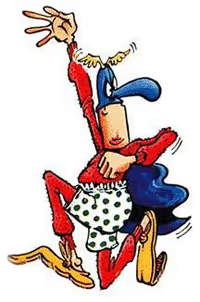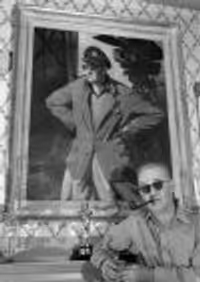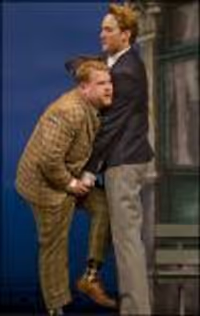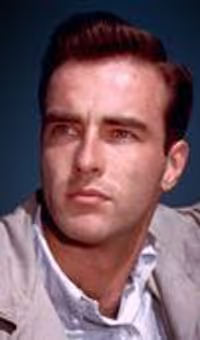Pick Your Top 5 Favorite and Least Favorite Best Picture Winners
bobs3
Broadway Legend Joined: 4/8/12
#50Pick Your Top 5 Favorite and Least Favorite Best Picture Winners
Posted: 2/11/14 at 9:14am
In alphabetical order:
Favorites:
Casablanca
The Godfather
The Godfather Part II
Lawrence of Arabia
No Country for Old Men
Least favorites:
An American in Paris
Around the World in 80 Days
Crash
The Greatest Show on Earth
Rain Man
#51Pick Your Top 5 Favorite and Least Favorite Best Picture Winners
Posted: 2/11/14 at 3:29pm
Favorites
THE SOUND OF MUSIC
WEST SIDE STORY
GONE WITH THE WIND
HOW GREEN WAS MY VALLEY
ROCKY
Least Favorite
MY FAIR LADY
SILENCE OF THE LAMBS
THE ENGLISH PATIENT
FORREST GUMP
CHARIOTS OF FIRE
Roscoe
Broadway Legend Joined: 5/15/03
#52Pick Your Top 5 Favorite and Least Favorite Best Picture Winners
Posted: 2/11/14 at 3:57pm
I'm breaking the rules here, I can't narrow it down to only 5 favorite Best Picture winners. Sue me.
FAVORITE:
2003 - "The Lord of the Rings: The Return of the King"
1977 - "Annie Hall"
1974 - "The Godfather Part II"
1972 - "The Godfather"
1963 - "Tom Jones"
1962 - "Lawrence of Arabia"
1943 - "Casablanca"
1934 - "It Happened One Night"
1931/1932 - "Grand Hotel"
LEAST FAVORITE
2005 - "Crash"
2004 - "Million Dollar Baby"
2002 - "Chicago"
1996 - "The English Patient"
1964 - "My Fair Lady"
The Least Favorite are really the bottom of the barrel. OUT OF AFRICA almost made it, but then I remembered that it at least has a few precious moments of Klaus Maria Brandauer acting Meryl Streep off the f*cking sceen.
#53Pick Your Top 5 Favorite and Least Favorite Best Picture Winners
Posted: 2/11/14 at 5:10pm
FAVORITE
Annie Hall
Terms of Endearment
On the Waterfront
Rebecca
Grand Hotel
LEAST FAVORITE
Slumdog Millionaire
Crash
Chicago
Gladiator
Forrest Gump
#54Pick Your Top 5 Favorite and Least Favorite Best Picture Winners
Posted: 2/11/14 at 5:50pm
I agree that the first 20 minutes of Saving Private Ryan were intense, but only because it was so heavily concentrated, not because it was any more visceral or intense than most of Schindler's List. After the first 20 minutes, it was bland, heavily cliched, and by comparison, quite dull. I didn't see any reason it would deserve Best Picture at all.
I agree with besty that Shakespeare in Love was quite unique and there was something very "special" about it. It was such a surprising film in many respects. The cast, the screenplay, the wit, the romance. I've always been surprised by the backlash around its win every time I watch it. It's really quite beautiful and definitely more balanced than Saving Private Ryan.
#55Pick Your Top 5 Favorite and Least Favorite Best Picture Winners
Posted: 2/11/14 at 6:04pm
"It isn't the "darkness" that turns me off about the Coen brothers work, strummergirl. My choice that year would have been the brilliant (and very dark) There Will Be Blood. As I said, it's their arrogant POV and (what seems to me to be) a general mean-spiritedness toward the human race. It's a huge turn-off to me in nearly all of their films. No Country was no exception."
Like I said in the other post, you either are into the Coens or you're not but they stayed true to who they were with the film that they finally got a Best Picture/Best Director win in. Not begrudging you at all for your opinions on them. I actually was opining about that year in general and why one of the weirder choices for Best Picture won.
Updated On: 2/11/14 at 06:04 PM
#56Pick Your Top 5 Favorite and Least Favorite Best Picture Winners
Posted: 2/11/14 at 6:10pm
For me, the worst best picture was The English Patient, which won over the brilliant Fargo.
Yes, that was pretty bad. But I thought A Beautiful Mind winning over Moulin Rouge was even worse.
#57Pick Your Top 5 Favorite and Least Favorite Best Picture Winners
Posted: 2/11/14 at 6:25pmYou know, I love the Coens, but more for how strongly they stick to whatever their vision is more than I actually love any of their films. Some I love, some leave me completely cold, but I'm so happy they've carved a niche industry for themselves to make films like they do. No studio would greenlight a bluegrass-themed adaptation of Homer's Odyssey or a super-serious spy thriller where every character is a thundering moron. Their films are hit-or-miss for me, but I adore their stick-to-it-iveness, for lack of a better term.
#58Pick Your Top 5 Favorite and Least Favorite Best Picture Winners
Posted: 2/11/14 at 9:27pmSAVING PRIVATE RYAN is beyond mediocre. It has a tiresome and bloody first 20 minutes, that have zilch to do with the paltry narrative that follows. What follows is nothing more than an expanded, and less engaging episode of the old TV series, COMBAT! I'm always surprised when someone cites it as a favorite.
#59Pick Your Top 5 Favorite and Least Favorite Best Picture Winners
Posted: 2/11/14 at 10:37pmMust say, I loved The English Patient. Admittedly, I haven't seen it since I was 19 or 20, but I remember it being an exceptionally well made big, capital "H" Hollywood epic. I think Anthony Minghella had an exquisite eye and a deeply sensitive touch. I also unabashedly adored his Cold Mountain and his untimely death still makes me sad.
#60Pick Your Top 5 Favorite and Least Favorite Best Picture Winners
Posted: 2/12/14 at 12:02am
For me, The English Patient is far from the worst (or my least favorite) winner. Still, it drags a lot ... a LOT. But the story is solid, so is the acting, and so is the entire production. Then you get to the last 20 minutes, and suddenly it intensifies with a very emotional payoff.
So after nearly falling asleep a few times, I found myself involved in the outcome and moved by the ending.
I would have voted for it, among the five nominees that year.
blocked: logan2, Diamonds3, Hamilton22
#61Pick Your Top 5 Favorite and Least Favorite Best Picture Winners
Posted: 2/12/14 at 12:09am
I'm grateful for the qualifier "favorite" in lieu of the far more complicated "best". Selecting the Best Picture winners from among the films I turn to again and again and again:
All About Eve
American Beauty
My Fair Lady
Ordinary People
Annie Hall
'Least favorite' is tougher. I'm not a dedicated enough cineaste to stick with a film that I'm not enjoying, so there aren't many here that I feel comfortable saying that I've seen AND really disliked. There are a few, though:
Forrest Gump
BraveHeart
Terms of Endearment
#62Pick Your Top 5 Favorite and Least Favorite Best Picture Winners
Posted: 2/12/14 at 6:59am
I'm glad people here aren't coming down hard on the earliest winners. Perhaps it's because many are unfamiliar with them, but I'm hoping it's because you're a little forgiving. Often I see "least favorite" Oscar-winners pulled from the first ten or even five years. I think that's unfair, based on both the popular styles of the era and the technology available at the time.
I've been watching the Best Pictures in order from the beginning and have made it through the first six so far: Wings, The Broadway Melody, All Quiet On the Western Front, Cimarron, Grand Hotel, and Cavalcade.
I would put none of them at the bottom of the heap, although they each have a few flaws. The best of the early winners would probably be All Quiet on the Western Front, still one of the most powerful anti-war films ever made.
What comes through the most about these earliest winners is the strong stories. Each of them gets the majority of its impact and strength from the overall narrative, despite pacing issues of various degrees, some hammy (by today's standard) acting, some odd and clumsy editing (again by today's standards), and usually a lot of background "hiss" due to the early sound equipment (except for the silent winner Wings).
The story is the thing. And all six of the earliest winners have exceptional, even ground-breaking cinematic stories. Cimarron, Cavalcade, and Broadway Melody each have a very strong central female character, too (and each received an Oscar nomination in recognition: Irene Dunne, Diana Wynyard, and Bessie Love, respectively.
It's also interesting to see just how quickly things progressed in those first six years of early sound movies, from no sound, to adapting the acting styles and storytelling to include and even favor the spoken word.
blocked: logan2, Diamonds3, Hamilton22
#63Pick Your Top 5 Favorite and Least Favorite Best Picture Winners
Posted: 2/12/14 at 9:25am
"Often I see "least favorite" Oscar-winners pulled from the first ten or even five years."
Quite the contrary.
I think every era tends to think that they invented the ability to tell stories, fall in love, be funny, etc. Watching those early films--especially pre-1934--is a powerful reminder that our (great?) grand-parents knew all about love, sex, and humor. And--to your point--they knew how to tell a story.
Roscoe
Broadway Legend Joined: 5/15/03
#64Pick Your Top 5 Favorite and Least Favorite Best Picture Winners
Posted: 2/12/14 at 9:28amBest-- agreed on the concentration on story in those early Oscar winners, and even on stories, as in multiple narratives, as in the surprising GRAND HOTEL, one of my favorites of that early batch of Oscar winners. Always very fresh and lively, the one drag on the film is Garbo's gloomy Boronskaya who is an utter pill -- why on earth Barrymore falls for her when there's that glorious Joan Crawford at her absolute sexiest hanging around. It can only the be money. Still, Garbo's helpless "I want to be alone" always catches me off guard -- not the expression of Star Diva Attitude it often came to epitomize, but in the context of the film a genuine moment of real emotional despair.
#65Pick Your Top 5 Favorite and Least Favorite Best Picture Winners
Posted: 2/12/14 at 9:58am
Honestly, I'm still trying to wrap my head around the whole Garbo mystique and obsession. She was such a huge star back then, and everyone thought she was pure magic on the screen.
Even understanding the era (as much as I can) and the idea that she was one of the few who made the transition from silents to talkies without even a minor stumble in her career.
I can only guess that she was just so unusual. She was like a rare bird from an exotic land to them. Maybe I've seen too many spoofs and imitations of her. Or maybe I just see how much of her "unusual" personal was clearly an act. A transparent one, at that.
I agree that Joan Crawford completely steals the film from Garbo, and Lionel Barrymore is the other standout among the ensemble of mega-stars. Again, it's the story that stands out the most, though. Particularly the ending. I always tear up when Lionel and Joan decide to get together for his final days and go to Paris. And I also tear up watching Garbo, even in her crazy-eyed hopeful radiance, as she get into the car, heading for the train, not knowing her lover is dead. And that powerful shot of the telephone ringing and ringing, while the dog sits on the bed, also unaware that his master has died.
Really powerful storytelling. Even with the technological limitations of the day, and the somewhat clumsy artistic styles during the early switchover to sound films.
Crawford still rules the roost, though. She is completely magnetic and so fascinating in that film. One of her very best.
blocked: logan2, Diamonds3, Hamilton22
#66Pick Your Top 5 Favorite and Least Favorite Best Picture Winners
Posted: 2/12/14 at 10:13am
I enjoyed watching Cimarron again, too. Probably the most clunky and dated of the early bunch, but again with a very powerful story by Edna Ferber.
Ferber's three major works, at least on screen, were Show Boat, Cimarron, and Giant, and all three share a lot in common. They all show the development of a family over many decades. They all have one mixed-race couple in the story (Show Boat: white and African-American; Cimarron: white and American Indian; and Giant: white and Latino). And race is an underlying theme in all of these stories (just like social inequality plays such a role in nearly all of Dickens' works).
Another interesting tidbit: Both Irene Dunne and Edna May Oliver were in stage productions of Show Boat, just a couple of years prior to filming Cimarron together. Edna was in the OBC as Parthy, and Irene played Magnolia in the tour. Two "Show Boat"/Ferber alumni uniting for another Ferber project.
blocked: logan2, Diamonds3, Hamilton22
#67Pick Your Top 5 Favorite and Least Favorite Best Picture Winners
Posted: 2/12/14 at 10:18am
If I were to list my 100 favorite movies, only three would be Best Picture Academy Award winners; and, most wouldn't include Academy Award winners for acting, either. Which is probably why I watch the least amount of TCM during their 31 Days of Oscar.
Updated On: 2/12/14 at 10:18 AM
Roscoe
Broadway Legend Joined: 5/15/03
#68Pick Your Top 5 Favorite and Least Favorite Best Picture Winners
Posted: 2/12/14 at 10:21amYeah, the whole Garbo mystique is hard to get nowadays. I can't blame folks for not feeling it. I myself didn't get it until I saw NINOTCHKA. I do like her silent performances, though, especially in FLESH AND THE DEVIL and THE JOYLESS STREET.
#69Pick Your Top 5 Favorite and Least Favorite Best Picture Winners
Posted: 2/12/14 at 10:41amYES! Ninotchka is wonderful!
#70Pick Your Top 5 Favorite and Least Favorite Best Picture Winners
Posted: 2/12/14 at 10:48am
I love her in Ninochka as well, but to me it's a one-off. She's almost spoofing her own screen persona, and does it so well. And her comedy timing is excellent.
I'm not sure she even liked who she had "become" on screen with all that heavy-handed heaviness. Ponderous drama. I think it comes through in her performance as Ninochka.
blocked: logan2, Diamonds3, Hamilton22
Roscoe
Broadway Legend Joined: 5/15/03
#71Pick Your Top 5 Favorite and Least Favorite Best Picture Winners
Posted: 2/12/14 at 10:53am
Certainly the heavy-handed DRAMAS Garbo was stuck in didn't offer her much range to do much but suffer and suffer and suffer some more., all those weepies. Her femme fatale role in FLESH AND THE DEVIL is a lot of fun to watch. And her big drunken speech in NINOTCHKA is a real joy.
#72Pick Your Top 5 Favorite and Least Favorite Best Picture Winners
Posted: 2/12/14 at 11:53amI'm here for the Lubitsch love.
#73Pick Your Top 5 Favorite and Least Favorite Best Picture Winners
Posted: 2/12/14 at 5:18pm
I will say this ... the real game-changer for Best Pictures as far as ACTING goes was "It Happened One Night."
It's like it jumped a decade in the advancement of style and cinematic approach. I know a lot of people who say Gable and Colbert won for "fluffy" performances that weren't really worthy. Not remotely, in my book. They're both excellent, but when you realize it was only 1934 and how much they improved the screwball rom-com genre, I give them a lot of credit for their work.
blocked: logan2, Diamonds3, Hamilton22
#74Pick Your Top 5 Favorite and Least Favorite Best Picture Winners
Posted: 2/12/14 at 5:43pmWho says they won for "fluffy" performances? There's nothing fluffy about those incredibly dynamics turns. In fact, I think many actors working today would benefit from just taking a look at that film. The actors build chemistry and deliver those lines with such conviction, and they understand exactly where to emphasize each line of dialogue to get the emotion just right. The acting in that film from both Colbert and Gable is spectacular, IMO. I definitely agree with you, Besty that is a game-changer; the first time I saw the film I remember being shocked because (somewhat ignorantly) I didn't realize that there were people doing that kind of acting in the 1930s, which I usually associate with more grandiose, stylized sort of acting. Though it's not in my top 5, IT HAPPENED ONE NIGHT is definitely one of the best winners. What's sad is I don't think that kind of film would win today. I was very happy when Jennifer Lawrence won last year for a performance that I think recalls Colbert though.
Videos








